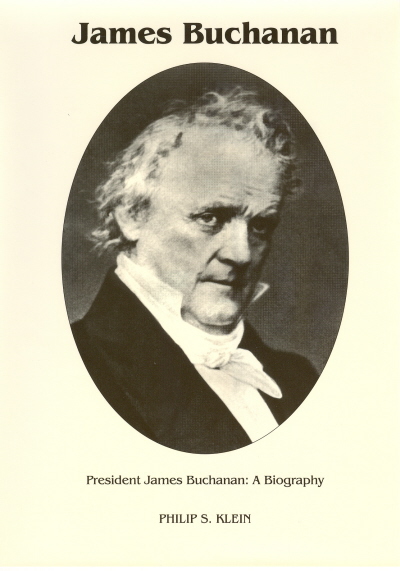JAMES BUCHANAN: PRESIDENT
by Philip S. Klein
ISBN 978-0-945707-11-0 $35.00
506 pages including notes, bibliography, index, and illustrations.
The life of James Buchanan is in essence the story of a man who
declined to be a dictator. Republics are traditionally ungrateful, and in
Buchanan's case the American republic has been notoriously thankless to the
man who was, from log cabin to White House, the relentless foe of fanatics
and demagogues; a man who held that reason and restraint were the essential
tools of self-government, and who bent all his energies to achieve by means
of law and diplomacy what others later sought to accomplish by civil war.
As a result of nearly fifty years' experience in the public
service, James Buchanan entered the presidency with more advance training
than any man who has ever held that post. As a Congressman he sustained
the power of the Supreme Court to review state laws in an argument that Charles
Warren has called "one of the great and signal documents in the history of
American constitutional law." In the Senate he worked incessantly to
keep clearly defined the delicate line between the powers of the executive,
judicial, and legislative branches and between the state and federal governments.
While he was Minister to Russia he negotiated the first commercial treaty
with that country; his English Mission diminished the traditional American
hatred for England and laid the foundations for subsequent Anglo-American
friendship.
As Secretary of State he presided over negotiations leading
to the acquisition of the western third of the Continental United States,
launched the "good neighbor" policy in Latin America, and insisted upon international
rights of neutrals and the rights of American citizens abroad. Buchanan
the politician maintained control of his home state against the challenge
of such powerful rivals as Simon Cameron, George M. Dallas, and Thaddeus Stevens.
In the presidency he fought sectionalism by initiating policies intended
to arouse national patriotism, and he sought by law to attain a long-range
solution to the slavery problem. In the closing months of his term
of office he refused to yield to the demands of extremists, both northern
and southern, for knew that either course would precipitate a war which almost
no one wanted.



